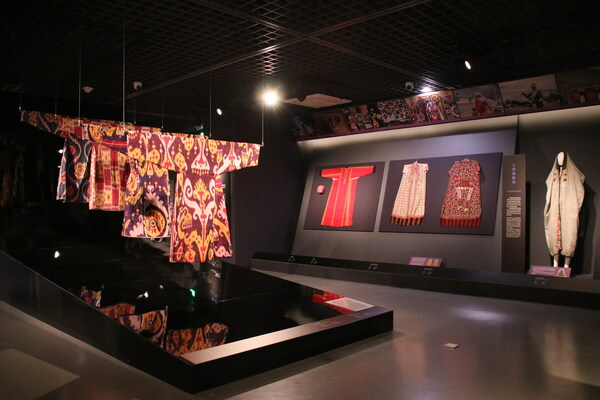HANGZHOU, China, Sept. 8, 2023 /PRNewswire/ -- On September 1st, the China National Silk Museum proudly announced the opening of its latest exhibition, "Colorful Asia: Asian Costumes Exhibition," held in the Fashion Gallery of the museum. This captivating showcase features a remarkable collection of 140 pieces and sets of exhibits representing the rich cultural heritage of 27 Asian countries and regions, and will run from September 2 to November 12, 2023.
"Asia" means "the place where the sun rises". Asia is the world's largest continent, with mountains, plains, islands, and wetlands creating a diverse ecology, and is the birthplace of ancient human civilizations like the Two River Basin, Indus River, and Chinese. Asians have created over 1,000 ethnic groups and colorful clothing civilizations, with each having its own representative clothing style, which showcases different socio-cultural backgrounds and the exchange, influence, and integration of Asian clothing cultures through the land and maritime Silk Road.
Hangzhou is hosting the 19th Asian Games in September 2023. To mark the occasion, China National Silk Museum is hosting the Asian Games-themed "Colorful Asia: Asian Costumes Exhibition."
The exhibition is divided geographically into East, Southeast, South, Central, and West Asia and showcases 18th- to 20th-century Asian clothing art. Through this exhibition, international participants in the 19th Asian Games and Hangzhou residents can learn about Asia's exquisite, diverse, and hybrid clothing styles.
China National Silk Museum will also invite five groups of textile-making technique inheritors as Intangible Cultural Heritage to perform during the Asian Games, demonstrating the need to preserve and pass on these techniques and their current development. The onsite techniques showcased include Batik resist-dyeing from Indonesia, Songket from Malaysia, Piña handloom weaving from the Philippines, Chakan embroidery from Tajikistan, and Traditional Textile weaving from Bhutan. The techniques have either been inscribed on the UNESCO Representative List of the Intangible Cultural Heritage of Humanity or award-winning from their community. In Hangzhou, the inheritors will demonstrate them and foster "dialogues" with local techniques.
The Queen Sirikit Museum of Textiles, Thailand, the Samarkand State Museum-Reserve, and the State Museum of Arts of Uzbekistan have loaned exhibits to the exhibition, which is also supported by the International Council of Museums Asia-Pacific Alliance (ICOM ASPAC).













